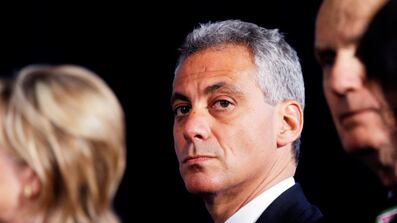Those who doubt that Rahm Emanuel can become the next mayor of Chicago make a good argument.
First, there are a slew of candidates. Within 24 hours of Richard Daley's stunning announcement that he will abdicate next May, news accounts had identified more than 30 who might be interested in his job, a list that hasn't yet shrunk. One half expects Oprah Winfrey to make it shortly.
Second, there's the sense that Emanuel doesn't have a local base broad enough to carry him, though he represented the North Side's 5th Congressional District (the Rostenkowski-Blagojevich district) from 2002 to 2009. A headline writer in the Sun-Times summed it up: "Rahm has money, but no solid base."
Third, he's got some enemies, some even organizing what seems an "Anybody but Rahm" campaign. The Washington-based Progressive Change Campaign Committee recently sent an email blast asking recipients to "Sign the pledge: I will not support Rahm Emanuel in any future election." The committee blames Emanuel for urging the president to drop the public option for health-care coverage. Organized labor might also favor other candidates, perhaps inflamed by a Rahmism in Steven Rattner's book Overhaul, just published this month. Rattner, who led the president's auto-industry bailout task force, has Emanuel questioning why General Motors should be saved. When an official mentioned that GM employed tens of thousands, Emanuel allegedly replied, "Fuck the UAW." (UAW President Bob King told The Washington Post that the anecdote is "baloney.")
But Emanuel, who has been interested for years in the idea of a mayoral run, has been here before.
When he ran for Congress for the first time in 2002, he was one in a field of eight in the Democratic primary.
He had prominent enemies. Emily's List poured money into the campaign of the favorite, Nancy Kaszak, who had a good track record with progressives, a solid base in the working class (cemented by a pro-labor voting record in the Illinois House), and a record of having backed legislation aimed at helping small businesses. As the campaign wound down, well-respected political columnist Steve Neal wrote Emanuel off as "a carpetbagger" running a "blatantly sexist" campaign. Neal indicated that Kaszak was likely to capture the sizeable Polish vote, and, according to a recent poll, she led by significant margins among women, blue-collar men, and senior citizens. The poll showed Kaszak leading Emanuel 33 percent to 18.

Thirty-three days later, Emanuel beat Kaszak 50 to 39 percent. His seat was never in jeopardy thereafter, and after being elected four times, he resigned reluctantly in 2009 to become President Barack Obama's chief of staff.
Illinois Chamber of Commerce CEO Douglas Whitley was decidedly unexcited about Rahm as a mayoral candidate. "I don't have any negatives and I don't have any significant positives," he said.
Daley's sudden announcement has put all of the hopefuls in the same jam. The first problem is one of time and shoe leather. Nominating petitions with 12,500 valid signatures are due by November 22. In Chicago, signatures are taken very seriously. (In his first campaign for public office in 1996, State Senate candidate Barack Obama knocked four opponents off the ballot—including the incumbent—by challenging the signatures on their nominating petitions, and thereafter cruised to victory.) The local rule of thumb is that you need to file twice the required number to survive challenges, and a candidate who wants to rest easy will file 2.5 to three times the number needed.
The second problem, more likely to trim the field, is financial. Voting will take place on February 22, and if no candidate gets a simple majority, a runoff between the top two finishers will occur on April 5. Chicago-bred campaign consultant Eric Adelstein estimates that a top-tier campaign would cost $2.5 million to $4 million, depending on the field. "Having the money doesn't mean you win," Adelstein says, "but not having it guarantees you lose."
The third problem is putting together a campaign organization on short notice, one that can frame your issues to differentiate you from the field, that can identify supporters and get them to the polls.
All of these hurdles are ones that Emanuel has leapt before. Signatures will not be his Achilles heel—he knows well how the game is played in this city.
Nor will he be flummoxed by the logistics of organizing a campaign, having run not only his own but also the Democrats' successful drive to win the majority in the House in the 2006 elections, something they hadn't been able to do since 1992.
And money should be no problem. The nonpartisan Center for Responsive Politics puts his net worth at $5 million to $13 million (a fortune made between 1998 and 2002, when he served as managing director of the Chicago office of investment-banking firm Wasserstein Perella). The CRP also reports that Emanuel has $1.2 million in his campaign chest, surplus from his last congressional campaign. During his political career, he has benefited from large donations from national corporations (Madison Dearborn Partners, AT&T, UBS, Goldman Sachs, Citigroup, Chase, and others), though given the administration's passage of the financial-reform bill last summer, perhaps that well is no longer so deep. But the bottom line is that he is a prodigious and tireless fundraiser. "He would break your arm to get money out of you," one Democratic Party activist told me. "I know because he has done it to me. And there are too many people he has done favors for. If I were thinking about running for mayor and then suddenly in comes this tornado, I would think twice."
Yes, he will no doubt have opposition from the liberals he famously called "retarded" last year. But his voting record in Congress was liberal on bedrock issues of gun control and abortion. Organized labor may have another darling, but then again, in the Kaszak race, the Illinois AFL-CIO endorsed Emanuel.
"[Kaszak] had the good labor record, but [Emanuel] had the record of knowing his way around Washington," Bill Looby, a spokesman for the group told The Nation. "The feeling was, [Emanuel] could be more effective in Washington."
It might seem that the civic and business community would embrace him—with friends like Goldman Sachs and Richard Daley, he can't be the hooligan-in-a-suit he sometimes appears to be, but in an interview on Thursday, Douglas Whitley, president and CEO of the Illinois Chamber of Commerce, was decidedly unexcited.
"I don't have any negatives and I don't have any significant positives," Whitley said.
Whitley couldn't recall ever asking Congressman Emanuel for a meeting on any issue during his years in Congress. "My impression of Rahm Emanuel is mostly that he has been the man behind the curtain, whether he was on Bill Clinton's staff or raising money for Mayor Daley or advising Barack Obama. He's not the most transparent operative. He may be extremely successful and extremely effective, but it is mostly done off stage."
While the group has never endorsed a candidate for mayor of Chicago, Whitley implied that this time around they might, and that what they'd be looking for is what Richard Daley gave them: "reliability and confidence and stability… someone who they could talk to, who listened, who cared about the city and wasn't playing tribal wars."
One question looms, however: Why would anyone want to be mayor at this particular moment? The city is in dire economic shape. The schools are sorely lacking, despite Daley's longstanding concern, and are running deficits of hundreds of millions of dollars. There will be no grand projects to inspire the masses—the Olympic bid failed, and the budget isn't there for another civic improvement like Millennium Park. While it might be argued that the mayor's job doesn't come up very often, it seems more likely that it now might, that whoever is elected next will not be seen as a savior four years from now, and a new face will be called for. Contrary to what's been said about the need to seize the moment, Emanuel may have plenty of time.
John Conroy, widely known for his coverage of the Chicago Police torture scandal, is the author of Unspeakable Acts, Ordinary People: the Dynamics of Torture and Belfast Diary: War as a Way of Life.





